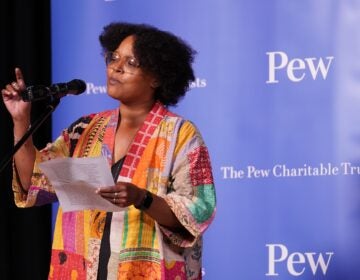Grim budget outlook for Cook-Wissahickon sends teachers and staff into action mode
Amid mounting protests and looming deadlines, staff and families of a Northwest Philadelphia elementary school gathered this week to address the Philadelphia School District’s projected 2013-2014 school year budget deficits.
Projections were grim within the cafeteria of the Cook-Wissahickon School: a $304 million budget shortfall by the district that PSD leaders hope to address with a $60 million request to the city and a $120 million request to the state, with the difference ballasted by concessions from the teacher’s union.
Without the funding and concessions, Philadelphia schools are facing the loss of assistant principals, guidance counselors, librarians, music teachers, athletics and summer programming.
A survey of the faces of the dozens of parents present on Wednesday night suggested many emotions – shock, anger, and dismay being among the more prevalent.
Establishing priorities
Cook-Wissahickon Principal Karen Thomas called the meeting with hopes of establishing an action plan for the coming weeks.
On Monday, Thomas had submitted a school budget that, based on class-size limitations, would provide for 18 classroom teachers along with 4.6 other teachers and special education personnel. According to Thomas, this would result in a net loss of two classroom teachers.
Beyond that, said Thomas, “There’s really nothing else except me,” adding that federal Title I funds had been reduced by two-thirds. Together, she said that it adds up to a largely untenable situation.
“It would be difficult to open the doors of this school safely – or at all – with the lack of funding that we have,” said Thomas.
Assistant Superintendent Andrea Coleman Hill supported Thomas’ observations, saying that public education in Philadelphia needs to have a firmer foundation of financial support. Hill said the funding that is available is being eroded as money is diverted to charter schools and virtual schooling.
To address this, she recommended that families and school staff come together to lobby for permanent funding, noting that the funding predicament is occurring yearly, and is more pronounced.
In the meantime, Hill said principals are being asked to devise a priority list, in case funding is restored.
“City Hall and Harrisburg need to know that the [PSD] is invested in its children and we need permanent funding sources so that we can staff our school properly, have proper programs and supplies, and have everything in place for them to succeed,” she said.
Seeking help from key Philadelphia leaders
Despite the presence of these representatives, several parents were upset that higher-ranking school officials and political officials weren’t present, with special ire reserved for Fourth District Councilman Curtis Jones, Jr., who was said to have had a scheduling conflict.
However, Jones’ staffer Joshua Cohen was present, and told those in attendance that City Council is currently debating funding options, including a liquor-by-the-drink tax, use and occupancy taxes, and other possible measures.
Cohen suggested that residents contact their councilperson along with council-members at large in order to achieve as wide of a network of political support as possible by the time a budget is adopted. He also suggested forming a coalition to lobby at the state level.
Reached in Harrisburg a few hours before the meeting, state Rep. Pam DeLissio said she wasn’t informed of the Wednesday meeting at Cook-Wissahickon, and didn’t have sufficient time to get there.
However, DeLissio said that she plans on being at an upcoming event that will continue the discussion about funding for Philadelphia schools.
A forum for parents of school-aged children in the Northwest is planned for later in the month. Entitled the “Roxborough Corridor Parents’ Summit,” the group will convene for a public meeting at Roxborough High School on May 20 at 6:30 p.m.
‘This is a crisis’
Representing parents on Wednesday afternoon was Rebecca Poyourow. She lamented that parents have little voice in district operations, and expressed frustration over the seemingly-cyclical nature of dire budgetary prognostications and resultant lobbying efforts by parents.
“We feel manipulated,” Poyourow said, referencing 2011, when parents mobilized to restore school programs only to find that funding was ultimately available.
“That was a crisis, and this is a crisis,” she said, “but we want a real budget, based upon real numbers before we go out there and lobby for [the district] again.”
While parents will again be forming coalitions to lobby for funding from both the state and local levels, some attention at the meeting was turned to the potential for additional private partnerships, resembling an arrangement that Cook-Wissahickon currently has with Progressive Business Publications.
As Hill noted, 100-percent of any such money stays with the school, and has no impact on district-based allocations.
While no clear-cut answers are forthcoming in the short-term, statement of resolve and determination are moving parents and staff forward.
“We’re all in this together,” said first-grade teacher Kimberly Jones. “We’re all from Philadelphia.”
WHYY is your source for fact-based, in-depth journalism and information. As a nonprofit organization, we rely on financial support from readers like you. Please give today.




